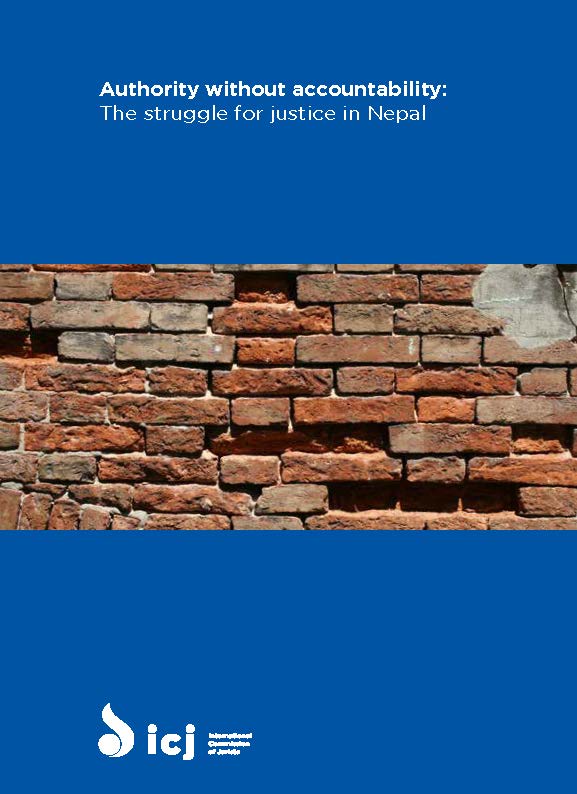The report explains how the historic system of statutory immunities in Nepal, compounded by the lack of political will, has prevented victims of human rights violations from obtaining effective remedy and reparation for their injuries.
The ICJ released its new 117-page report Authority without Accountability: The struggle for justice in Nepal today in Kathmandu.
During Nepal’s decade-long civil war, serious human rights abuses were committed by government security forces as well as the armed Maoist insurgents, with an estimated 17,000 persons killed, many unlawfully, and over 1,300 subject to enforced disappearance.
Despite an explicit commitment to provide for effective justice in the peace agreement between the Maoists and the government, to date, no one has been prosecuted or convicted for any conflict-related human rights violations.
Three successive governments between 2008 and 2012 have withdrawn more than 1055 criminal cases in the district courts, with many cases involving allegations of unlawful killings, torture and ill-treatment, including rape and other sexual violence.
“The political identity of the government has changed but the culture of impunity remains the same,” said Sheila Varadan, ICJ South Asia legal advisor. “Political parties continue to exploit the well-established system of political privilege and embedded impunity for personal interest and political gain.”
Numerous public officials continue to enjoy impunity for alleged violations of human rights in Nepal. For instance, Colonel Raju Basnet, suspected of being involved in the systematic enforced disappearance and torture in 2003, was promoted to Brigadier General in October 2012.
Inspector General of Police Kuber Singh Rana, who was allegedly involved in the extra-judicial killing of five students, has been promoted twice and is now the most senior police officer in the country and in charge of implementing urgent reforms that focus on accountability.
Bal Krishna Dhungel, leader of the Unified Communist Party of Nepal-Maoist (UCPN-M), was convicted of murder and sentenced to life imprisonment in 2011, but continues to be an active politician and will contest in the November 2013 parliamentary election.
Agni Sapkota, another UCPN-M Central Committee member, allegedly involved in the unlawful killing of Arjun Bahadur Lama, was appointed as Minister of Information and Communication in May 2011, despite a March 2008 Supreme Court order directing police to investigate the allegations against him.
The ICJ notes that none of the major political parties have made any tangible commitments to address accountability for human rights meaningfully, including in political manifestos in the lead up to the Constituent Assembly election in November.
“The major political parties seem unwilling to address the systemic impunity prevalent in Nepal, both for past violations and present conduct,” Varadan added.
“If there is to be lasting peace and political stability in Nepal, the people of Nepal must be afforded their right under international law to an effective remedy and reparations for violations of human rights,” Sheila Varadan said. “The Nepali people have consistently demanded justice. It’s time the politicians and military listened and delivered.”
The ICJ calls on the major political parties in Nepal to publicly pledge that, if elected, they will commit to implement the following:
(1) Ensure the new constitution does not permit any State official to grant an official pardon, withdraw a case or grant an amnesty to anyone suspected or convicted of an offence constituting a gross human rights violation or crime under international law;
(2) Enact legislation to ensure that any parliamentarian or State official against whom there are credible allegations of responsibility for gross violations of human rights or crimes under international law are suspended from service in public office, including armed forces personnel representing Nepal in international peace-keeping operations, at least pending the outcome of an independent and impartial investigation and fair trial;
(3) Limit the application of Section 5.2.7. of the Comprehensive Peace Agreement to ensure that only those cases brought during the course of the conflict and up to – and not after – the signing of the Peace Agreement are eligible for withdrawal, while also ensuring that cases involving credibly allegations of gross human rights violations are not withdrawn;
(4) Implement the decisions of the Supreme Court issuing instructions to the Attorney General and all relevant law enforcement personnel to proactively and vigorously pursue all cases alleging serious violations of international human rights law;
(5) Review the Public Security Act, 2046 (1989), the Police Act, 2012 (1955), the Armed Police Act, 2058 (2001), and the Army Act 2006, in order to remove any immunity afforded to State officials for gross violations of human rights.
Contact:
Ben Schonveld (Kathmandu), ICJ South Asia Director, t: +977 9804596661; email: ben.schonveld(a)icj.org
Sheila Varadan (Kathmandu), ICJ South Asia Legal Advisor, m: +977 9803654599 ; email: sheila.varadan(a)icj.org
Sam Zarifi (Bangkok), ICJ Asia Pacific Regional Director, m: +66 807819002 ; email: sam.zarifi(a)icj.org
Nepal-SUMMARY-Authority without Accountability-Publication-report summary-2012 (full text in pdf)
Nepal-FULL-Authority without accountability-publications-report-2012 (full text in pdf)

